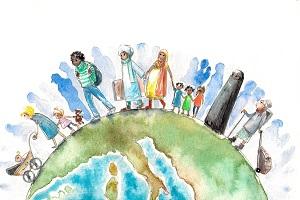
Migration is an old and growing phenomenon – the United Nations Populations Division estimates that around 266 million people live outside their country of origin. In the UNECE region, by 2019 there were around 45 million people from Eastern Europe and Central Asia living abroad, with more than 10% of the working age population leaving for opportunities outside their home countries in many post-Soviet states. Some UNECE member states, such as Israel and Armenia, have diaspora populations greater in number than their own populations.
The International Organisation for Migration defines diasporas as “migrants or descendants of migrants, whose identity and sense of belonging have been shaped by their migration experience and background.” More generally, the term refers to people who identify with their country or nation of origin but live outside of it.
Diaspora has substantial potential to drive economic development, innovation, and entrepreneurship in the migrant’s home countries, especially in countries with economies in transition. This potential goes far beyond remittances, which surely play an important role in the economic development of the host country, by increasing income, consumption and investment. As several examples show, the diaspora can bring skills, experience, connections, ideas, and capital for innovative, often export-oriented initiatives in their home countries. In fact, the diaspora has been pivotal in many of the success stories we have seen over the past decades, such as the rise of the automotive supply sector in Moldova or the export-oriented Information and Communication Technology sector in Belarus. Diaspora knowledge of and contacts in both their country of residence and country of origin often help diminish the risk of innovation and navigate different business environments and rules effectively – factors that are important in decisions to try out innovative, high-potential, but also inherently risky, ideas that could create substantial social return and help build the foundation for progressing towards the sustainable development goals and the circular economy.
Increasingly, UNECE member states recognise the diaspora potential and try out a range of policies and initiatives to use it more systematically. In this process, one central question has come to the fore: How governments can most effectively enable and promote the potential of diasporas to catalyse innovation for sustainable development?
Policy makers from UNECE member states, the International Organisation for Migration, the United Nations Conference on Trade and Development, and experts from the private sector and academia discussed and answered this question at a UNECE webinar on “Leveraging Diaspora for Innovation for Sustainable Development” on 31 May 2021.
Several insights and good practices emerged in the discussion. Central among these was the importance of engaging regularly with the diaspora, investing in communication and outreach and trainings, involving them in policy and strategy design. Monitoring closely the nature, skills, and interests of the diaspora to scout opportunities is a prerequisite for engagement. More and more countries have set up dedicated institutions and coordination mechanisms for diaspora affairs. Streamlining and reducing regulatory restrictions to investment, entrepreneurship, and labour mobility would remove several often unintended barriers to innovation. Concessional finance mechanisms targeting diaspora investment can often play an important role. Perhaps most importantly, while countries should try out and pilot a range of ideas, careful, continuous, and transparent monitoring and evaluation is imperative to ensure that scarce fiscal resources are put to good use and that support play a catalytic role, enticing more diaspora-led experimentation with new ideas to create value than would otherwise be the case.
The webinar was a side event of the 14th session of the UNECE Committee on Innovation, Competitiveness and Public-Private Partnerships. UNECE engages with member States further on this topic, notably through a dedicated chapter on diaspora for innovation in the upcoming Innovation for Sustainable Development Review of Moldova.